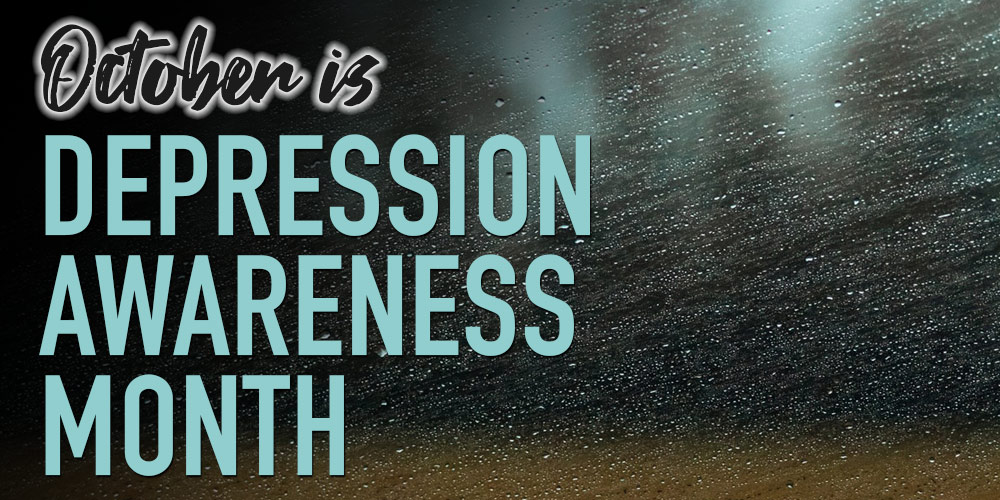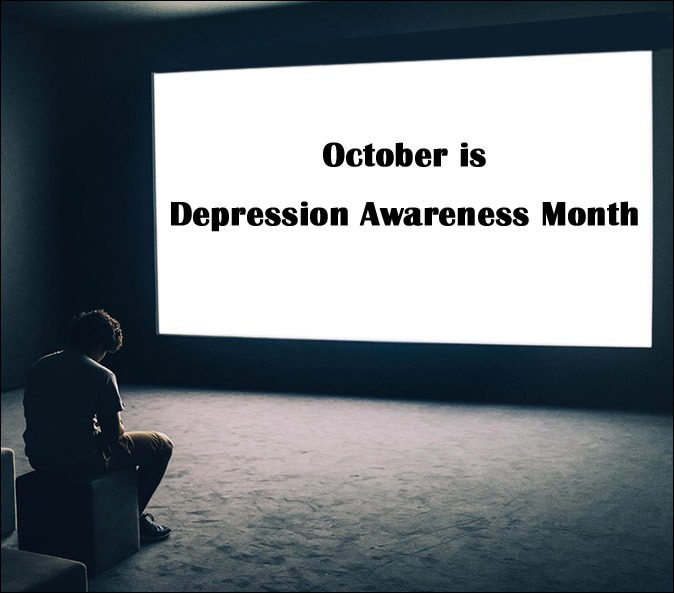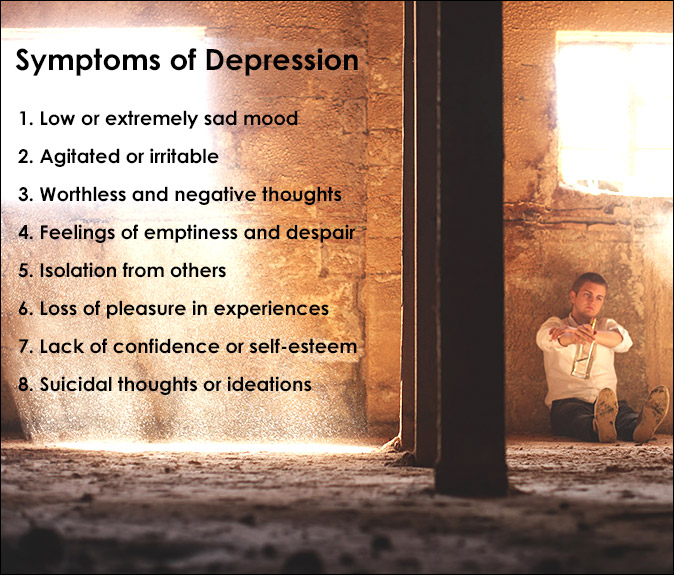
During Depression Awareness Month in October, we’ll be raising awareness to help people who are suffering with depression.
We’ll also stand with others for National Depression Screening Day on October 10. This awareness event is held every year on Thursday of the first full week in October during Mental Illness Awareness Week.
To better understand how depression can impact all of us, we’ll examine 8 signs and symptoms that signify a person might be depressed, consider whether or not depression is a “real” medical condition and offer 5 ways to help family members or friends who are suffering from depression.
Is Depression a Recognized Medical Condition?
Depression is often dismissed or shunned in society. Despite being the leading cause of disability worldwide according to the World Health Organization, many people insist that depression is not a real illness. This can lead to people being insensitive and saying inappropriate things like:
- Man up
- Cheer up
- Get over it
- Snap out of it
- Pull yourself together
Many people ask the question, “is depression a recognized medical condition?” Others go further and don’t even consider depression as a real problem. It’s unfortunate that so many people think depression is simply a trivial issue and not a genuine condition.
Depression is a very real illness affecting an estimated 17.3 million adults in the United States, a number that represents 7.1% of all U.S. adults.
Experiencing a low or sad mood periodically is normal for everyone. However, if these feelings persist and are coupled with other symptoms, then depression could be the cause.
Depression is a serious illness that impacts a person’s ability to function in everyday life and in the worst cases can leave them unable to leave the house.
Related: Depression and Addiction

Can Depression Be Cured?
In one word, No, there is no cure for depression. Just like addiction or diabetes, these are lifelong conditions that a person will live with once they are clinically diagnosed, and there is always a chance of relapse or recurrence.
Thankfully, depression can be successfully treated and managed and many people will recover without ever experiencing debilitating symptoms in the future.
Some people who do have a recurrence after treatment often find that the symptoms are only minor or more manageable compared to those they experienced before learning coping strategies or reducing the symptoms with medication.
There are different types of depression and a range of treatment methods that can be uniquely tailored to each person’s individual needs.
Medication, cognitive therapy, and exercise have all shown to be effective for managing symptoms and a combination of the three is the most promising.
For National Depression Screening Day, anyone can take a free online self-screening to verify their symptoms. This is can be used as an informal assessment to determine if a formal medical diagnosis by a doctor should be performed to validate the symptoms.
Mental Health America (MHA) offers tests for ten of the most common mental health conditions. These mental health tests can be taken online anonymously without the need to provide any personal information to take them.
What Causes Depression?
Like other mental illnesses, depression doesn’t normally come alone as there are often a number of causes and symptoms. Depression can result from, or develop into a substance abuse disorder.
People often reach for alcohol or legal and illegal drugs to escape from the crippling feelings that rise up due to their illness.
One research study led by Ronald Kessler of Harvard Medical School discovered that people who live in wealthy countries are more likely to be depressed.
Researchers in the study said, “rich countries tend to have greater income disparities between the very rich and very poor, which could play a role in the development of depression.”
Signs and Symptoms of Depression
Depression symptoms can range from mild to severe. The severity increases with the number of symptoms a person feels and each one can lead a person to behave differently.
In its worst form, depression can be debilitating and lead to suicide. Severe depression can also result in psychotic symptoms such as delusions and hallucinations, which can be frightening and unbearable for many people.
8 Common Symptoms of Depression
While this is a short list of the many possibilities, a person who is suffering from depression might experience one or more of the following common symptoms:
- Low or extremely sad mood causing a person to be upset or tearful
- Agitated or irritable
- Guilty, worthless and negative internal thoughts
- Feelings of emptiness, despair and hopelessness
- Isolation and unable to relate to other people
- Loss of all pleasure in life and experiences that were once enjoyable
- Lack of self-confidence or low self-esteem
- Suicidal thoughts or ideations
It’s important to get help as early as possible because depression can impact all areas of life. If a person doesn’t get treatment, it can affect their ability to work, manage finances, their wellbeing and relationships. The feelings of helplessness and low self-esteem can result in social isolation, which can increase the impact of depression.
5 Ways to Support Someone Who is Depressed
When someone close to us has depression, it can cause undue stress and worry, making it difficult to help them through their pain. The good news is that friends and family can play a pivotal role in recovery.
Here are 5 ways to help someone who is suffering from depression:
1. Talk Openly
It’s important to talk openly about depression to help friends or loved ones express how they are feeling. Don’t be critical or judge a person who is suffering from depression.
Allowing them to talk freely and express their thoughts and feelings without the fear of judgment is a great form of support.
2. Really Listen
Rather than judging how they should feel, help them to explore their emotions candidly. Learning how to be silent and really listen is a difficult, but valuable skill to master.
People don’t always want advice – they often just want to be heard.
3. Support Them To Ask For Help
By reassuring people that it is okay to ask for help, we can make asking for help more acceptable.
There is no shame in having any form of mental health issue, and supporting those who need help is one of the goals of Depression Awareness Month.
4. Keep In Contact
Having depression can be a very lonely experience, so simply keeping in touch can make a big difference. A person who has depression might not want to bother others with their problems, and usually won’t take the initiative to stay in touch.
Friends and family need to make the effort to check in from time to time with those suffering with depression, not only to ensure they are okay, but also to let them know they are available any time they need to talk with someone about their feelings.
5. Take Care of Yourself Too
Being a caregiver can be exhausting, both mentally and physically. It’s crucial to take time out for self-care when attending to the needs of others who are in pain.
Flight attendants always say to put on your own oxygen mask first and then assist your child or others. Self care is never selfish – it is necessary to be mentally and physically sound to help those who need help.
Depression Awareness Month in October is a good time for anyone struggling with the symptoms to learn more about treating this mental health condition.
Because it is so common, there are many movies about depression that illustrate how it impacts the lives of others.
People of all ages, genders, nationalities and status can develop depression, often for no apparent reason. It’s not a sign of weakness to step forward and ask for help.
Many people feel ashamed to express that they are feeling depressed, self-loathing or anxious. Pressure to always succeed and do our best can thwart our ability to ask for help.
Understanding that depression is a legitimate problem that requires attention can be a pivotal step forward to erasing the stigma of mental health issues and seeking proper treatment.
Related Posts
- A Month of Awareness: National Recovery Month + Suicide Prevention Month
September is National Recovery Month and National Suicide Prevention Month to create awareness about each…
- June is PTSD Awareness Month
Because trauma impacts so many people, June is recognized every year as PTSD Awareness Month.…
- Psilocybin Therapy for Depression Treatment and Mental Health
The push to find new and effective treatment approaches for mental health issues like Psilocybin…

